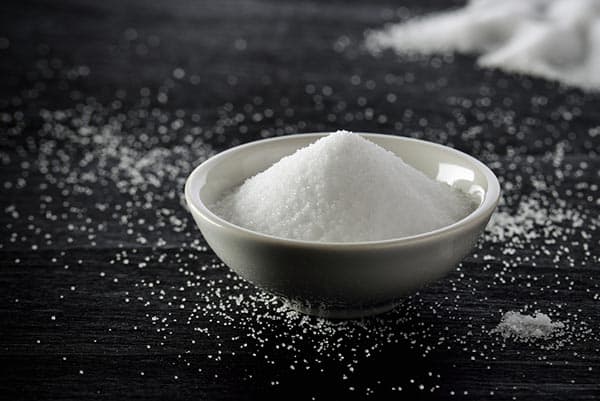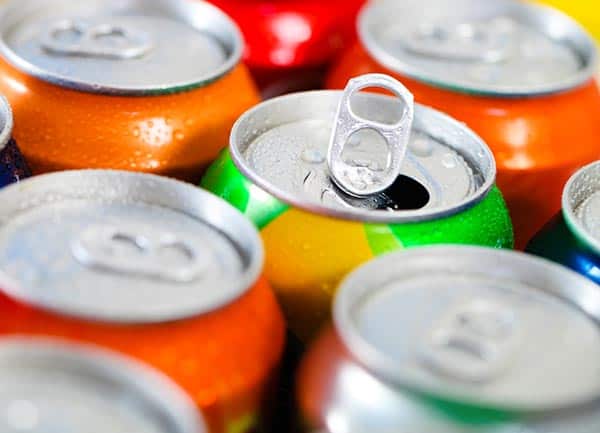If you are anything like me, you looked forward to the day you would be “old enough” where acne would no longer affect you. It seemed like the consensus was that acne is something most common in teens and would likely be grown out of. Unfortunately, this is usually not the case.
There are numerous different factors that contribute to acne, including hormones, age, family history, and last, but certainly not least… our diet. Something that thousands of individuals are consuming daily could be the culprit of this far from glowy skin.
Soda and other sugary sweetened beverages have many negative effects on the body, one, sadly, being acne.
The Truth about Soda and Acne
Soda. It is so tempting and sweet but that is exactly the issue. There is a great deal of information out there about soda and how it affects our health. It can be quite overwhelming, even to someone like me who has studied this for years.
At a basic level, we know that foods high in sugar are not only highly addictive but are also contributing factors to many health problems including obesity, heart disease, and overall inflammation in the body. Not to mention sugar is the leading cause of cavities. Although soda may not be directly seen as a common cause of acne, it is linked to inflammation, which we all know is far from beneficial to our bodies.
Inflammation
The reason why inflammation is a concern is not just because you may have joint pain or a headache, it can be much deeper than that. If the inflammation goes on chronically and untreated it can lead to things like heart disease, severe allergies, chronic obstructive pulmonary disease (COPD) and arthritis. When in an inflamed state, the body has a hard time regulating our hormones, blood sugar etc. This can lead to things like a pesky breakout.
Why Does Soda Cause Acne?
So, what is it about this tasty, sugary drink that our body refuses to make peace with? Sugar. Sugar is a very broad term in the nutrition world. There are so many formulations and types of sugar out there. The reason I say this is because, yes, fresh fruits and vegetables have sugar in them, but they are naturally occurring sugars.
Natural Sugars
Naturally occurring sugar, in short, is just as it sounds: it is naturally in the strawberries and mango and often comes with an array of health benefits.
Here is an example; tomatoes have natural sugar because they are a fruit but they also have lycopene which is an antioxidant. This specific antioxidant has lots of health benefits including potentially reducing the risk of breast, lung, and prostate cancer. My point is that although food products like this may have sugar when they are combined with other great benefits, they are not a threat to our health. Keeping in mind that everyone’s health concerns are different and not all fruits and vegetables should be consumed in large amounts without consulting your physician. Especially on specific medications like blood thinners.
Added Sugars
Then you have the dark side of sugar and consuming it in the form of things like cake and soda, it serves no health benefits and can be damaging to our body.
Added sugars. Again, they are as they sound. These are added to packaged products before they go on the shelves. According to the American Heart Association, the major sources of added sugars are “regular soft drinks, sugars, candy, cakes, cookies, pies, fruit drinks, and dairy desserts.” It can be difficult to find packaged items without some form of added sugar in the ingredient list and nearly impossible to avoid completely.
Caffeine Content
Caffeine is a stimulant and is the most commonly consumed psychoactive drug in the world. Many people drink caffeinated beverages such as coffee or soda in order to get a boost of energy when they are tired. However, caffeine has several negative side effects that can contribute to increased acne and sebum production. Caffeine has a natural diuretic effect and causes you to lose fluids more quickly than normal. Additionally, the “energy boost” you feel from caffeine is primarily due to a cortisol spike, which increases stress and can lead to hormonal acne.
Important to Note
Something to keep in mind when you are looking at a food label is the ingredient statement. This can be very telling and helpful to whether this item is a good choice in terms of wholesomeness and overall health. Ingredients are always listed in descending order by weight. This means that the first few ingredients are the most prominent in that food item.
Next time you go to pick up a can of soda, look at the ingredient statement, what are the first few ingredients? When you drink the soda, what are you going to be consuming in the largest amounts? The answer is… carbonated water and high fructose corn syrup, another form of added sugar with no health benefits.
Are Some Sodas Better for Acne?
Trying to pick a soda that is “healthier” for you, is like trying to pick the alcohol that will make you the least hungover. There really is just no avoiding how it negatively affects your body. Yes, there are diet sodas, which provide much fewer calories but when you look at the ingredient statement, they contain aspartame.
Aspartame is a sugar substitute that tastes 200 times sweeter than table sugar and because of this should not be consumed in high amounts. This sweetener is approved by the FDA and has no concrete links to health concerns, but it does spike your blood sugar. When our blood sugar goes way up, this increases the release of insulin.
To keep it simple, insulin is directly linked with the release of many hormones in the body and as we know, so is acne. The fluctuation of hormones can cause an inflammatory response (inflammation) and therefore often leads to acne in many individuals.
Can Soda Cause Skin Issues Other Than Acne?
The chemicals and sugar contained in soda can cause several skin issues outside of acne breakouts. The insulin spikes caused by sugar and aspartame increase inflammation and oil production in the skin. This can cause your skin to appear both puffy and greasy over an extended period of time. It has also been known to exacerbate the dark circles that appear under some people’s eyes.
Common Questions about Soda and Acne
Sugar-free sodas like Zevia, are typically more comparable to seltzer water than a sugar-sweetened beverage and potentially a better option to reach for when craving something bubbly.
That is not to get confused with thinking sugar-free sodas are a nutritious beverage. They contain carbonated water and some form of an extract like Stevia leaf. Although Stevia is still a sugar substitute, it is said to not have as much of an effect on blood sugar as table sugar and other sugar alternatives. If our blood sugar is stable, insulin and other hormones have a better chance of maintaining optimal levels.
Although any regular soda will contain high amounts of sugar, there are some that could be considered worse than others.
The sweetened beverages with the highest amounts of sugar are Mountain Dew, Mug Root Beer, Pepsi, and Coca-Cola. With higher amounts of sugar, they are more likely to cause extreme spikes in blood sugar, acne, obesity, and many other health concerns.
Of course, water is one of the best drinks for not only our skin but all our organs and body systems. The human body is made up of over 50% water and when we are lacking, the body struggles to operate properly. Consuming optimal amounts of water assists with digestion, weight loss, energy levels, and hydration of the skin!
If we are dehydrated our body puts in work to help the skin recover and ends up overproducing oil, which can lead to acne. When looking at different drinks out there, I would again suggest looking at the ingredient statement. What are the first few ingredients? Then decide from there if it is the best option for you.
Verdict
Consuming anti-inflammatory foods should be the most beneficial to the skin, alongside lots of H2O. Mediterranean-style diets have the largest amounts of anti-inflammatory foods with the main goal to keep the body in balance. Many people write into this blog asking some version of “What can I do to get rid of my acne?” Many people expect the answer to be to buy this soap or take this supplement. However, the right answer for most people is to stop doing something. Cutting out foods and drinks that are high in sugar will do more to decrease the severity of your acne than any pill or skin cream. Additionally, cutting the sugar out of your diet will help regulate your blood sugar levels which will make your skin brighter, more vibrant, and help clear blemishes and acne scarring.
Avoiding highly processed foods is very important here because like we mentioned before, highly processed foods have a lot of different chemicals and additives in them to enhance flavor and help with preservation. Some highly processed foods include canned foods, processed meats and cheeses, dairy, and bread products.
Foods with few and whole ingredients are a good place to start. Ingredient statements that begin with whole-grain vs. high fructose corn syrup are important and something to look out for. You also want to make sure you can pronounce each of the ingredients, otherwise, it may not be meant to be digested by the body.
Clear It Up
In conclusion, soda consumption is not directly linked to acne. You most likely are not going to break out immediately after consuming a soda. But it is very important to keep in mind all the research out there on the effects of high amounts of sugar on the blood and specifically, our skin. When blood sugar rises a lot must happen in the body to bring those levels back down.
Consuming large amounts of added sugars increases inflammation and can poorly affect the condition of our skin. Inflammation is not just a headache or joint pain. Acne is a form of inflammation, just in the skin.
No one is perfect and just because some people do not drink soda, is not to say they will have perfect skin. Everyone’s skin type is different, but it is important to look at the simple steps that can help us with long-term improvements. We are all striving for similar goals in terms of our skin!
If you are looking for a drink that can reduce inflammatory acne and help promote hydration and healing I recommend reading up on the skin benefits of celery juice. Celery is low in sugar and packed with antioxidants and nutrients, which make it part of the ideal diet to help combat inflammatory acne. Additionally, celery is great for helping flush toxins out of the body. It’s not an accident that so many fitness influencers are frequently drinking green celery drinks and posting about it on social media.



